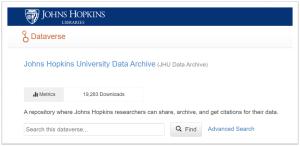This blog post was written by Chen Chiu
Need to share research data publicly? The JHU Data Archive can help!
Do you need to share data to fulfill funder’s or journal editor’s data sharing requirements? Does your journal editor ask for a data availability statement or a DOI (digital object identifier) for your data? Are you preparing for the upcoming NIH data sharing policy but don’t know where to share data? Do you have trouble deciding what to share or how to organize and document data for sharing?
JHU Data Services runs an institutional data repository, JHU Data Archive, to host research data and code created by researchers at Hopkins, making your data findable, accessible, interoperable and reusable (FAIR). You can contact dataservices@jhu.edu to learn more about JHU Data Archive or visit our Archiving page.
Frequently Asked Questions (FAQs)
Is the JHU Data Archive free for all JHU affiliates?
Yes, it is free for up to 1TB for users who are affiliated with JHU divisions that participate in our funding models. You can find the list of participating divisions here. We will charge a fee if
- Your data is more than 1 TB
- Your division is not listed in our participating divisions
Can I store my data with JHU Data Archive and only share them with my lab members and/or collaborators?
No, JHU Data Archive is not intended as storage for active research data. Its purpose is to provide open access to others interested in referencing and using research your data, and long-term preservation. You can contact your Department IT or JHU Central IT, if you are looking for a place to store and share research data with your lab members and/or collaborators.
How long does the whole process take?
In general, the whole process will take about one or two business week. The length of our archiving process depends on the quality of your documentation and how fast you can turn in the required forms and upload files. Visit our Archiving Steps page to learn more.
See more questions answered in our Archiving page.
Testimonials
“The whole process was rapid, easy, and couldn’t have been a better service in any way.”
“I’m glad that my contact person checked to make sure my code would run before uploading it to the archive as she found several missing dependencies that were not documented in my files.”
“Really, the deposit process went ever so much more smoothly than I expected. I expected more back and forth. I have deposited data with a NHLBI repository and I followed that model plus the guidelines provided by JHU Archives. I communicated with JHUArchives very easily – the staff were responsive, efficient, on top of things (catching a mistake on my part) and very helpful with suggestions and very helpful with providing links and explanations and instructions in a stepped fashion. Very impressive staff and option for JHU investigators. Thank you! The only suggestion I have is perhaps publicize your service more – I was not aware of it, but other people in our group were.”
Featured Data Collection
Neuroscience
Grupp, Robert B.; Unberath, Mathias; Gao, Cong; Hegeman, Rachel A.; Murphy, Ryan J.; Alexander, Clayton P.; Otake, Yoshito; McArthur, Benjamin A.; Armand, Mehran; Taylor, Russell H., 2022, “Data associated with the publication: X-ray computed tomography and fluoroscopy collected during cadaveric periacetabular osteotomy experiments.”, https://doi.org/10.7281/T1/C304HZ , Johns Hopkins University Data Archive, V1.
Medicine and Public Health
Turnbull, Alison E.; Ning, Xuejuan; Rao, Anirudh; Tao, Jessica J.; Needham, Dale M., 2019, “Data association with the publication entitled: ‘Demonstrating the Impact of POLST Forms on Hospital Care Requires Information not Contained in State Registries'”, https://doi.org/10.7281/T1/LJZQPI , Johns Hopkins University Data Archive, V2.
Social Studies
Morgan, Stephen L.; Pally, Joel A.; Baltimore Police Department, 2016, “Data and code for the report, “Ferguson, Gray, and Davis: An Analysis of Recorded Crime Incidents and Arrests in Baltimore City, March 2010 through December 2015″”, https://doi.org/10.7281/T1J10120 , Johns Hopkins University Data Archive, V7.

